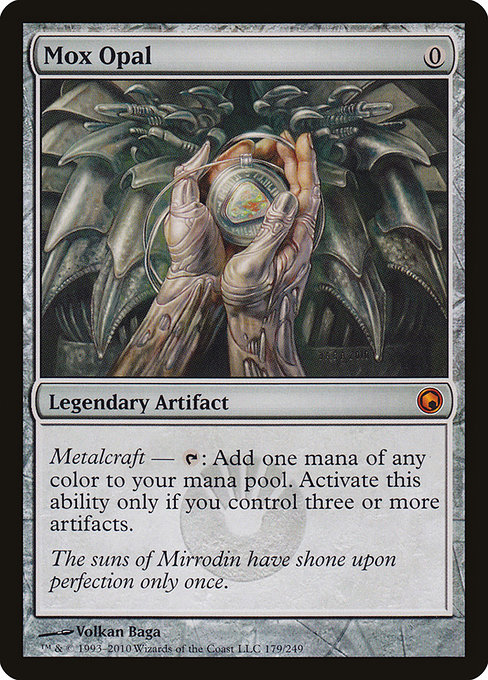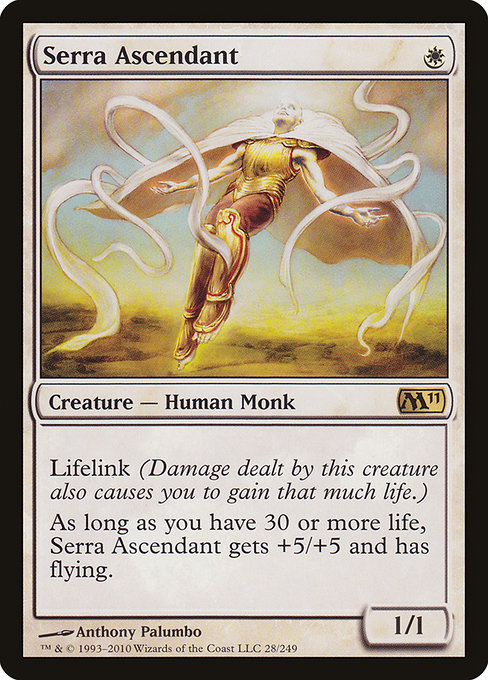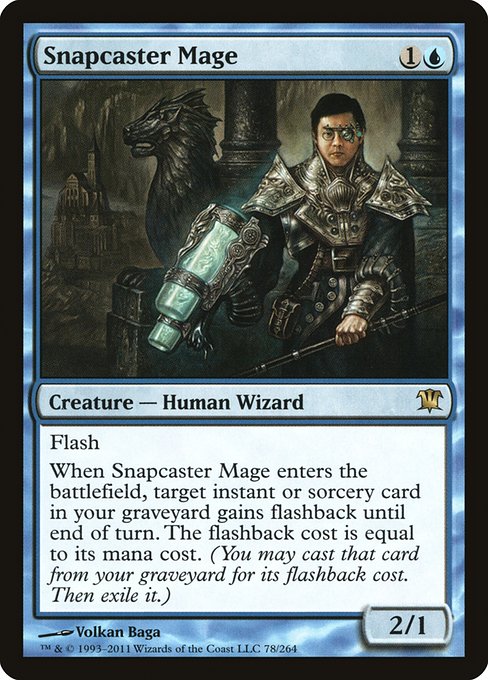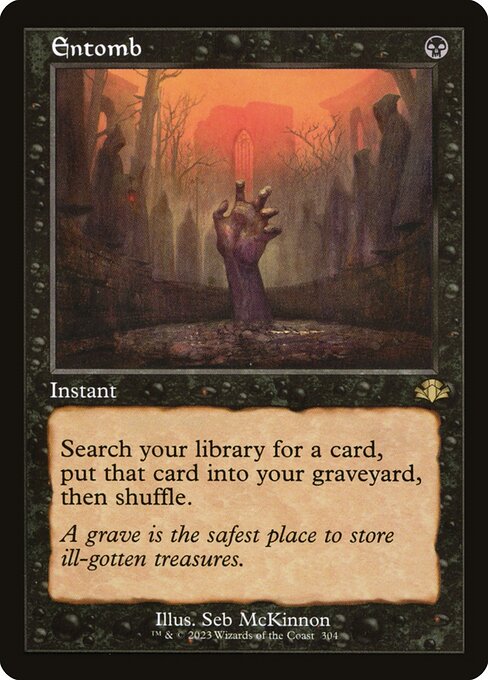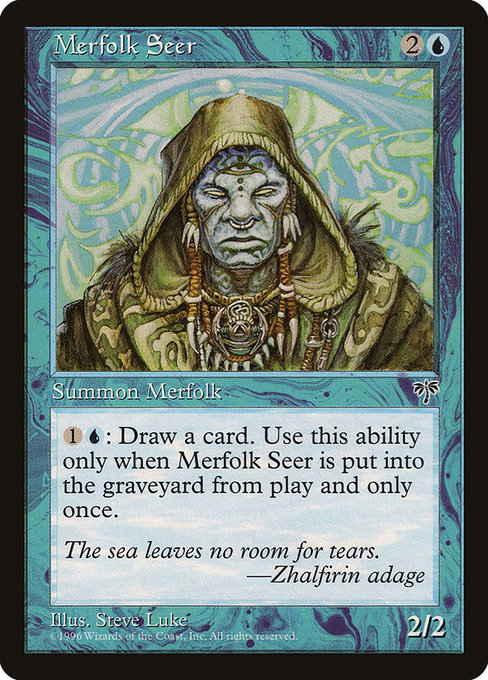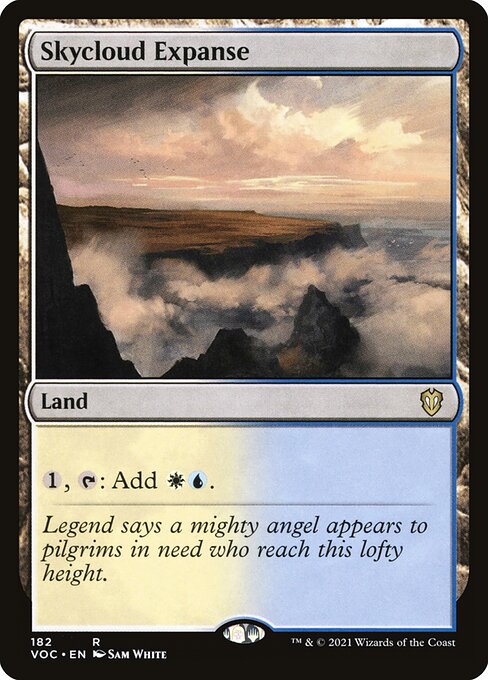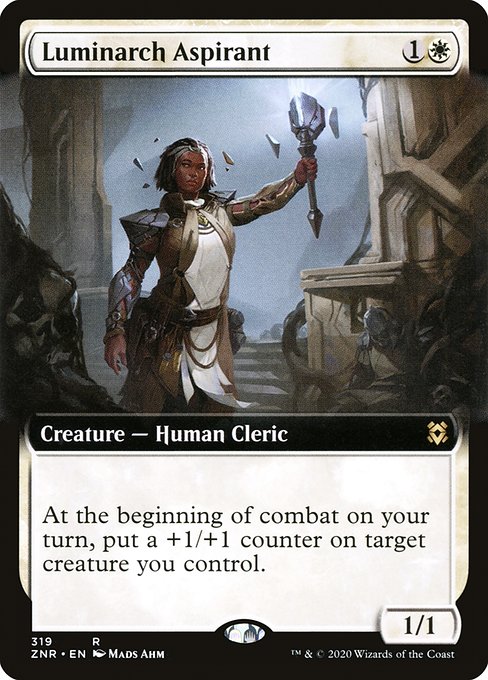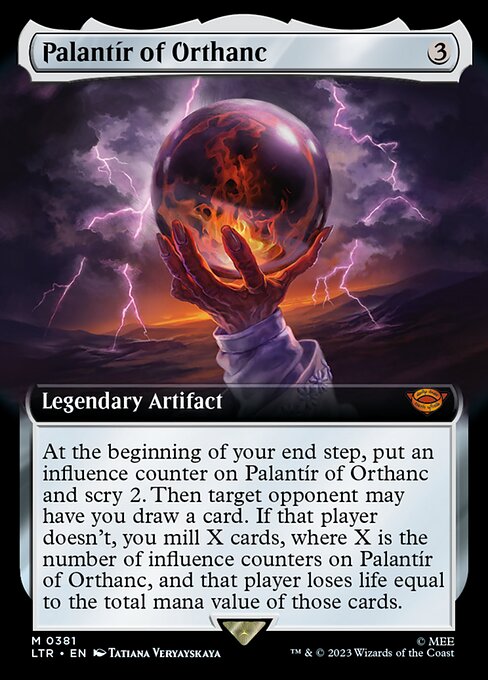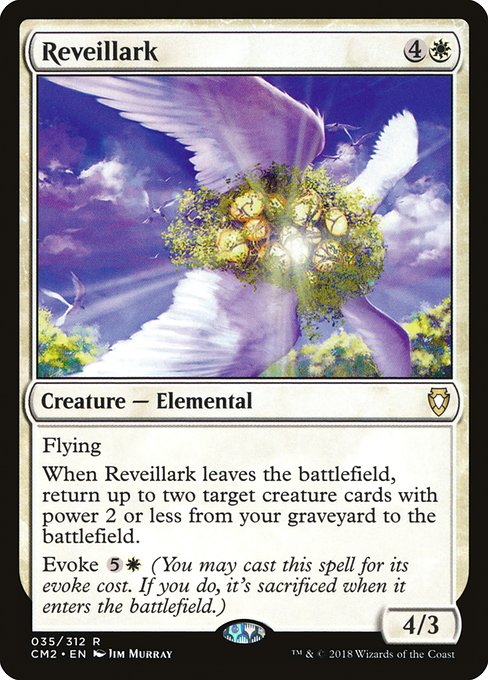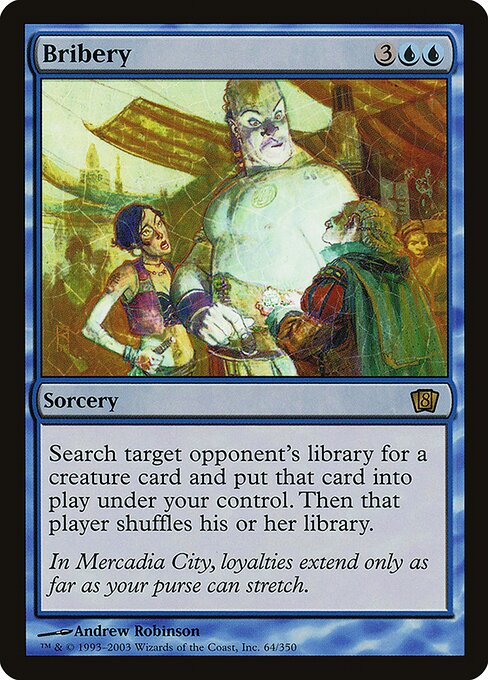
Bribery Full Guide

Guide Sections
Cards Mentioned in This Review
These cards are referenced in the strategy guide belowStrategy Guide
Last updated 2025-06-30TL;DR Summary
Bribery is a rare sorcery that can significantly impact game momentum. By searching for a creature card in an opponent's library and putting it onto the battlefield under your control, Bribery disrupts their plans while also gaining you an advantage. This effect is particularly powerful against players who rely heavily on specific creatures or combos, allowing you to sabotage their strategy and gain a strong advantage.
Card Mechanics & Interactions
Bribery
This rare sorcery from 8ed allows you to search a target opponent's library for a creature card and put it onto the battlefield under your control. The targeted player then shuffles their library.
Card Text Analysis
- Mana Cost: {3}{U}{U} - This is an unusual mana cost, but not unheard of in blue cards. With two blue mana requirements, Bribery is likely to see play in a more controlling or midrange deck.
- Type: Sorcery - As expected for a sorcery, Bribery's effect will resolve on the stack and then the battlefield.
Stack Analysis
- Resolution: Bribery resolves when it reaches the battlefield. At this point, you can search the targeted player's library for a creature card.
- Creatures in the Library: When searching the opponent's library, keep in mind that only creatures with a power and toughness of greater than zero will be considered valid targets.
- Targeting: The targeted player must have a creature in their library to put on the battlefield under your control.
Battlefield Analysis
- Putting Creatures onto the Battlefield: When Bribery resolves, you can put the searched creature card directly onto the battlefield under your control.
- Creatures Interacting with Each Other: If you search for and put onto the battlefield a creature with an ability that triggers on entering the battlefield, such as Tarmogoyf, this will trigger on resolution.
Edge Cases
When using Bribery to find a specific creature card:
- If you target a player who has no creatures in their library (or only ones with zero power and toughness), Bribery resolves but doesn't put any cards onto the battlefield.
- Sacrificing Creatures: If you use Bribery to put a creature onto the battlefield, you can then sacrifice that creature for various effects or uses.
Strategic Applications
Bribery is a powerful and versatile sorcery that can greatly benefit various Commander strategies, color identities, and archetypes. Its ability to search for and play a creature card from the opponent's library makes it an attractive inclusion in decks that rely on disrupting opponents' plans.
Competitive Builds:
- Merfolk tribal: In Merfolk-themed Commander decks, Bribery can be used to fetch high-power creatures like Lord of Atlantis or Daxos of Meletis.
- Blue-White control: In combination with cards like Counterspell and Hydroblast, Bribery can help control the board by disrupting opponents' creatures while maintaining a strong defense.
Casual Builds:
- Mill tribal: In Mill-themed Commander decks, Bribery can be used to fetch high-power creatures while also generating card advantage through mill effects.
- Mono-Blue tempo: In mono-blue tempo decks, Bribery can help generate an early game presence by fetching lower-toughness creatures like Phantasmal Bear.
Niche Builds:
- Value-oriented Commander: Decks that focus on value-oriented plays, such as Martyr's Bond and Estrid's Invocation, can benefit from Bribery's ability to fetch high-power creatures.
- Blue-Black artifacts: In decks featuring cards like Jug of Wisdom and Demonic Tutor, Bribery can help fetch artifact-boosting creatures.
When using Bribery strategically, consider the following:
- Timing: Play Bribery when you're confident in your ability to generate an advantage from the fetched creature.
- Opponent's library: Try to target opponents with a large number of low-toughness creatures or those that are vulnerable to removal effects.
- Card advantage: Use Bribery in conjunction with cards like Vampiric Tutor and [Mnemonic Betrayal to generate additional card advantage.
Keep in mind that Bribery can be played as early as turn 3, making it a valuable inclusion in many Commander decks.
Advanced Techniques
Bribery is a powerful card that rewards aggressive play and can be the linchpin of various Commander strategies. Here are some advanced techniques and interactions worth exploring:
Synergies:
- Tutors with Bribery: Cards like Serra Acolyte, Duskurrow Wurm, or Gaea's Cradle enable you to find a creature on top of your library, then search for another one using Bribery. This creates a cascade effect, allowing you to flood the board with creatures.
- Bribery with combo cards: When paired with cards like Dockside Extortionist, Estrid's Invocation, or Kumano Face (note: this card is not a direct interaction but an example of how to utilize Bribery), Bribery can help you generate additional mana, accelerate your combo, or create more opportunities for card advantage.
- Token generation: Cards like Atraxa, Praetors' Voice, Estrid, the Masked>>, or [[Kumano Face create tokens that can be targeted by Bribery, providing an immediate benefit.
Rules tricks:
- Bribery and 'stacking effects': When you use Bribery to put a creature on the battlefield, any stack-based effects (such as those from Bolas's Citadel or Mox Opal) resolve with the new creature as their target. This can lead to interesting interactions and potentially favorable results.
- Card advantage: Using Bribery to create an extra copy of a powerful creature can provide card advantage and accelerate your gameplan.
Interactions:
- Countering Bribery: Cards like Force Spike, Abrupt Decay>>, or [[Shatter can interact with Bribery, disrupting your opponent's plans and giving you an upper hand.
- Combating Bribery: When facing a player who is heavily reliant on Bribery, consider using cards like Grafdigger's Cage>>], [[Thalia, Guardian of Thraben, or [[Estrid's Invocation>> to counter their strategy.
Common Mistakes
Bribery: Timing Traps and Misunderstood Synergies
In Commander, Bribery is often misunderstood due to its unique interaction with the command zone. One common mistake is playing it on their own turn without considering the timing of their opponent's graveyard removal spells.
- Avoid using Bribery as a standalone play: Many players err by attempting to use Bribery as a one-turn kill or value dump. However, this often results in an opponent's graveyard removal spell resolving first, destroying Bribery and negating its effect.
- Timing considerations with graveyard removal: Be cautious when playing Bribery alongside cards like Rin, the Charioteer or Trostani's Summoner. These cards can create a precarious timing situation where Bribery is destroyed before it has a chance to resolve.
Other players often neglect to consider the card draw implications of Bribery. A more informed approach involves pairing Bribery with cards that benefit from additional card draws, such as:
- Phantasmal Terrain: This enchantment can increase the power and toughness of the creature brought in by Bribery.
- Rampant Growth: This enchantment can provide a temporary boost to the power and toughness of the creature.
Some players attempt to use Bribery as a way to generate card advantage, but this often leads to suboptimal plays. A more effective approach involves combining Bribery with cards that create additional value from the library, such as:
- Mnemonic Wall: This enchantment can provide a significant boost to card draw and allow for more efficient use of Bribery.
- Vampiric Tutor: This artifact can help find the right combination of cards to maximize Bribery's effect.
Conclusion
Bribery is a powerful and versatile sorcery that can significantly impact the board in Commander. Its ability to search for and play any creature card from an opponent's library makes it a valuable addition to decks that rely on disrupting opponents' strategies.
In terms of deckbuilding considerations, Bribery is best included in decks that have a high curve or rely heavily on creatures. It's particularly effective when combined with cards like Entomb or Phantasmal Tutor, which allow for even more precise targeting and control. Decks featuring aggressive creatures like Goblin Rabblemaster or Serra Ascendant can also benefit from Bribery, as it enables them to rapidly turn the tables on opponents.
In contrast, decks with low-curve removal spells or those that rely on controlling tempo through non-creature sources (e.g., Ancestral Recall, Mystical Tutor]) might find less value in including Bribery. Its impact is diminished when opponents have access to efficient sweepers like [[Eradicate or Plague Engineer, which can quickly clear the board of Bribery's played creature.
When using Bribery, consider the following:
- Use it sparingly, as its mana cost and potential for chaos can be overwhelming.
- Combine with other removal spells to minimize the risk of opponents responding with sweepers.
- Target opponents' creatures that are difficult to kill or have significant life gain/benefit synergies.
Ultimately, Bribery's strength lies in its adaptability and ability to disrupt opponents' plans. Its inclusion in a Commander deck should be carefully considered based on individual strategy and gameplay.
Deckbuilding & Synergies
Bribery in Action
This versatile sorcery is a staple in many blue decks, offering an instant creature acquisition at an unbeatable price. Its applications are numerous, making it a great fit for various Commander and non-Commander strategies.
Commanders and Color Identities
Bribery excels with the following:
- Estrid, the Masked (1v1): This commander's ability to create card advantage by sacrificing artifacts perfectly complements Bribery. It allows you to grab a creature from your opponent's library without disrupting your own.
- Rafiq of the Many
- The Azami Commander archetype
- Other tribal commanders, such as Atraxa, Praetors' Voice
Themes and Engines
Bribery works beautifully with various themes:
- Tribal decks: With cards like Golgari Findbroker or Ajani's Pridemate, Bribery provides an easy way to add to your tribal army.
- Combo and control: Bribery helps you set up a combo by giving you a specific creature, such as Snapcaster Mage or [Sylvan Caryatid.
- Artifact recursion: When paired with cards like Forked Bolt or Estrid's Invocation, Bribery becomes an excellent way to get an artifact back onto the battlefield.
Synergy Cards
Some notable synergy cards include:
| Card Name | Effect |
|---|---|
| Allows you to exile and return your creatures, making Bribery a great way to add them to your board. | |
| Spectral Procession | Enables you to create multiple tokens with Bribery's creature copy effect. |
Combo Notes
Bribery is an excellent addition to combo decks:
- Mill: With cards like Thought-Knot Seer or Mnemic Wall, Bribery can help you generate card advantage by discarding creatures from your opponent's library.
- Token generation: Pairing Bribery with tokens like Forked Bolt or Estrid's Invocation creates an efficient way to generate value.
Format Roles
Bribery's Impact in Commander
In Commander, Bribery is a powerful removal spell that can be played in blue-based decks. Its ability to search for a creature card from an opponent's library and put it onto the battlefield under your control makes it a valuable tool for disrupting opponents.
- Removal: Bribery serves as a flexible removal spell, capable of targeting any creature on the table.
- Card advantage: By putting a creature onto the battlefield, Bribery provides card advantage, allowing you to attack with an additional creature or use its abilities to influence the game.
- Potential combos: In certain deck archetypes, Bribery can be used in combination with cards like Liliana of the Veil or Jace, the Mind Sculptor to create powerful combo opportunities.
Formats and Availability
Bribery is legal in Commander, Pauper, and Vintage formats. Its competitive viability depends on the specific metagame:
- Competitive: In a format with a high number of aggressive creatures, Bribery can be an effective removal spell.
- Casual: In more casual games or drafts, Bribery's ability to disrupt opponents can make it a valuable inclusion in decks.
- Banned: There are no current bans on Bribery in any formats.
Prices and Rarity
As of the last update, Bribery's foil price is $29.95 USD, making it an expensive but rare card.
Key Scenarios
Bribery: A Flexible Toolbox Card
Bribery excels in situations where it can be used to disrupt opponents' plans or generate card advantage. Here are some key scenarios and matchups:
- Against control decks: Bribery's ability to search for a creature card and play it on the battlefield makes it a valuable tool against control strategies that rely heavily on removal spells and counter-magic.
- In games where Daze or Counterspell are being played, Bribery can help disrupt opponents' plans by allowing you to play a powerful creature that would otherwise be removed.
- In multiplayer: Bribery's ability to search for a creature card makes it an excellent tool for influencing the board presence in multiplayer games. By playing a creature on the battlefield, you can gain control of key areas of the board and pressure your opponents.
- Against Doom Blade-heavy decks, Bribery can help neutralize their removal spells by providing a strong creature to play around them.
- With artifact-heavy decks: Bribery's ability to search for a creature card makes it an excellent tool for artifact-heavy decks that rely on Golgari Findbroker or Omniscience-style cards.
However, Bribery can struggle in situations where:
- Opponents have established board presence: If opponents have already established a strong board presence with creatures and removal spells, Bribery's ability to search for a creature card may be less impactful.
- In games where opponents have Path to Exile or Swords to Plowshares on the battlefield, Bribery's effectiveness is reduced because you're more likely to draw into a removal spell than a powerful creature.
- Opponents are running a high-mana curve: If opponents are playing with a high-mana curve and have access to Frostburn Weird-style cards, Bribery may struggle to make an impact on the board.
Overall, Bribery is a flexible toolbox card that excels in situations where it can be used to disrupt opponents' plans or generate card advantage. Its effectiveness depends heavily on the specific matchups and game state.
History & Meta
Bribery has been a rare staple in many Blue decks since its introduction in 8th Edition. One of the most notable appearances was in the classic Merfolk deck archetype, which thrived during the early days of Mirrodin block. By enabling players to search for powerful creatures like Lure and Master Transmuter, Bribery helped fuel a midrange gameplan focused on controlling the board.
In Eternal formats, Bribery has seen play in some control decks looking to add consistency to their mana bases while also disrupting opponents with its ability to find key threats. In particular, it pairs well with cards like Daze and Counterspell, allowing players to maintain a strong defensive posture against aggressive strategies.
In recent years, EDHREC has identified Bribery as a staple in many Blue control decks, including those featuring Eldrazi Conscription and Vivien Reid. Its ability to find game-changing creatures like Aurelia, the Warleader and [Karmic Guide ]makes it an attractive addition to any Blue deck seeking to generate advantage.
On the rare side of things, a 2016 Beta foil printing of Bribery is listed on Card Kingdom for $29.95 USD.
Flavor & Lore
Bribery is a cunning sorcery that manipulates the opposition's library to fetch a creature card for the caster. When played, Bribery allows the player to search their opponent's deck for a creature and put it onto the battlefield under their control. This can be particularly effective in combination with removal spells like Oblivion Ring, which can eliminate unwanted creatures while creating opportunities for Bribery.
In the world of Magic, bribery has long been a tool of politicians and power brokers to secure influence over key territories and populations. The Simic Combine's penchant for using bribery to further their interests is well-documented throughout history. One notable example is the infamous "Deal of Argentum," where a powerful Simic adept used Bribery-like tactics to sway the vote in favor of the Combine's favored candidate.
The 8th Edition set, released during a tumultuous period in the world of Dominaria, saw an increase in cards that could manipulate and influence the game state. Cards like Dusk Collector and Golgari Findbroker demonstrate the growing importance of disrupting opponents' plans. Bribery's inclusion as a Rare card reflects its significance in this context.
The use of Bribery often relies on knowing the opponent's deck composition, particularly if they have access to powerful creatures that can swing the game in their favor. A well-timed Doom Blade or Swords to Plowshares can make it difficult for an opponent to recover from losing a key creature to Bribery.
When combined with cards like Counterspell, which allows players to react to spells being cast, Bribery becomes even more effective at disrupting opponents' plans. This synergy highlights the strategic value of understanding both one's own deck and that of their opponents to create opportunities for manipulation.
In terms of gameplay, using Bribery often requires a combination of knowledge about the opponent's library and access to removal spells or counterspells to mitigate potential risks. Successful use of this card typically involves anticipating which creatures an opponent is likely to play and being prepared to adapt to changing circumstances on the battlefield.
Budget/Alternatives
Bribery is a rare sorcery from the 8th Edition set that manipulates an opponent's library. For $29.95 in USD foil, it's a pricey card.
Price and Availability
- Bribery has been reprinted several times, including in the Commander Legends commander deck "Adventures in the Forgotten Vault".
- Its prices are relatively stable, but its rarity makes it hard to find affordably.
- If you're looking for an affordable option, consider Sage's Elixir or Thieves' Fortune, which offer similar effects at lower costs.
Budget-Friendliness
| Card Name | Mana Cost | Rarity | Price (USD) |
|---|---|---|---|
| Bribery | {3}{U}{U} | Rare | $29.95 |
| Sage's Elixir | {2}{U} | Uncommon | $1-$5 |
| Thieves' Fortune | {4}{R} | Common | $0.50-$2 |
For Commander decks, consider Sage's Library or Thieving Magpie, which can provide similar benefits at lower costs.
Alternative Options
When building a Commander deck, focus on cards that offer more flexibility and value. For example:
- Use Grafdigger's Cage to exile problematic creatures.
- Include Omniscience for a more straightforward approach.
- Add Mind Funeral or Sage's Library for card advantage and library manipulation.
When constructing your deck, keep these options in mind to ensure you're not overspending on Bribery.

